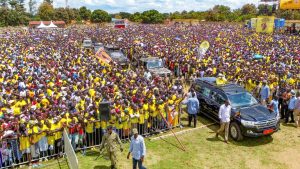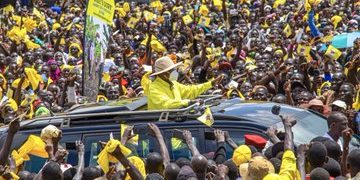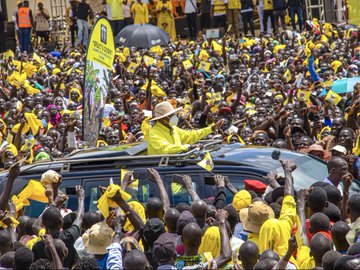Adjumani — President Yoweri Kaguta Museveni has reaffirmed his government’s commitment to improving the welfare of public servants, including teachers, but emphasised that Uganda must first strengthen its development foundations before considering further salary increments.
Speaking at a massive campaign rally at Paridi Stadium in Adjumani Town Council, President Museveni — the NRM Presidential flag bearer for the 2026 elections — wrapped up his West Nile sub-region campaign trail with a message centred on patience, peace, and sustainable national growth.
“We are not against increasing the salaries of public servants,” President Museveni said. “But first, we must secure peace, build roads, extend electricity, improve health services, and strengthen schools—then we can add on other things.”
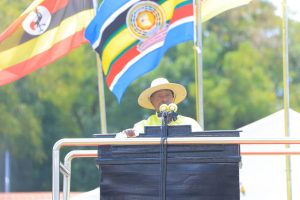
The President acknowledged the concerns of striking teachers and other public servants but cautioned against prioritising short-term gains over long-term transformation.
“You have been hearing teachers saying they want higher pay. But is it correct to demand more money when the roads are still in bad shape? Is that fair?” he asked, drawing applause from the crowd.
Focus on Infrastructure and Services
President Museveni reiterated that his government’s spending priorities are rooted in infrastructure and social services. Drawing from his own experience in the Uganda Peoples’ Defence Forces (UPDF), he said national duty often requires sacrifice.
“We in the UPDF have served for many years on little or no pay because we could not demand more from our mother, Uganda, knowing she didn’t have enough,” he said.
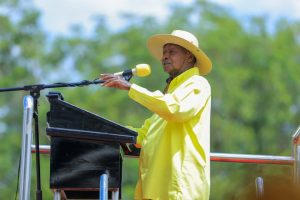
He pledged government action to rehabilitate key road networks in West Nile, including the Pakele–Pabo and Adjumani–Obongi roads, while noting the completion of the Gulu–Atiak–Adjumani route.
“Once we agree on the budget—what comes first—things will move,” he added. “Let’s handle the essentials first: roads, electricity, schools, and hospitals.”
A Century of Peace and Unity
President Museveni described Uganda’s current stability as “a historic achievement unmatched in more than a century.” He traced the nation’s journey from precolonial peace through periods of turmoil to the stability under NRM.
“It’s the first time in 100 years that the whole of Uganda is peaceful,” he said. “Our ideology of patriotism and Pan-Africanism has enabled us to defeat groups like Kony’s LRA and the ADF.”
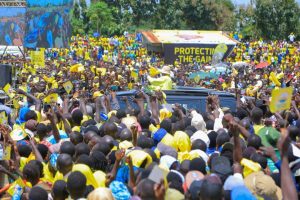
He credited NRM’s principle of supporting the right and opposing the wrong — regardless of tribe or religion — for uniting the country and strengthening institutions such as the army, police, and judiciary.
Social Development and Education
Turning to social services, President Museveni pointed to population growth in the Madi sub-region as evidence of improved health services.
“In 1969, the whole of Madi — including Moyo, Adjumani, and Obongi — had 90,000 people. Now, Adjumani alone has 300,000 because children no longer die from preventable diseases,” he said.
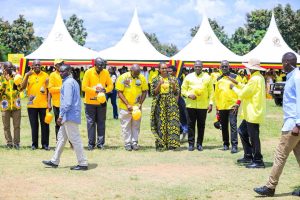
He reaffirmed his commitment to free education, promising that every parish will have a primary school and every sub-county a secondary school. He warned school administrators against charging illegal fees that lead to dropouts.
“No child should leave school because of money,” he said, highlighting his Presidential Skilling Hubs, such as the Olia Hub in Adjumani, which trains youth in practical skills. “I have already sent Shs 50 million per district to SACCOs for those who completed the training.”
Museveni also proposed a graduate support fund for university students who remain jobless for more than two years.
Household Wealth Creation
The President reiterated the need for Ugandans to embrace wealth creation initiatives like the Parish Development Model (PDM), which he said builds on earlier poverty alleviation programs.
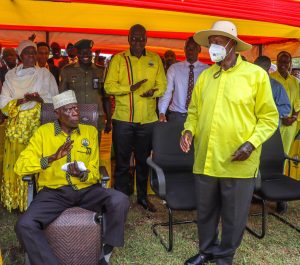
“Each parish gets Shs 100 million per year. If you borrow and repay with a small interest, that money stays in your parish—it never goes back to government,” he said.
He also proposed additional funds for parish leaders (Shs 15 million) and faith-based groups to promote local enterprise.
Oil and Future Prosperity
On oil, President Museveni described Uganda’s discovery as a turning point for national development. “The British searched for our oil from 1920 to 1956 but failed. When NRM came, we discovered it, and production will begin next year,” he said, adding that much progress has already been achieved without oil revenues.
The rally was attended by senior NRM leaders, ministers, and Members of Parliament from across West Nile, including Gen. Moses Ali, NRM Secretary General, Rt. Hon. Richard Todwong, and Hon. Hamson Obua, NRM Vice Chairperson for Northern Uganda.
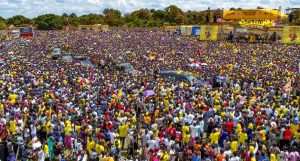
Rt. Hon. Todwong described President Museveni as “a symbol of stability and progress,” saying: “In President Museveni, we vote for hope, for the stability of our homes, and the future of our children.”
Hon. Obua commended the President for transforming Adjumani “from a district that once produced refugees to one that now hosts them peacefully.”
Adjumani District NRM Chairperson, Mr Akuku Charles, pledged full local support for Museveni’s re-election and requested more tractors to boost agricultural production. “Your Excellency, the people of Adjumani are fully behind you,” Akuku said. “We only ask for more tractors to expand farming and improve livelihoods.”
